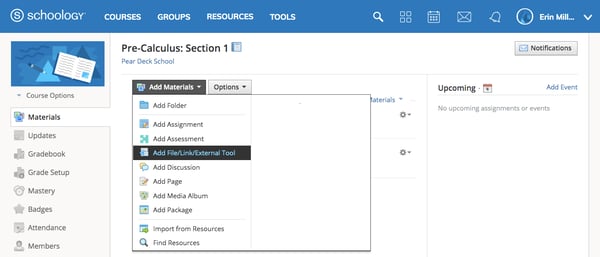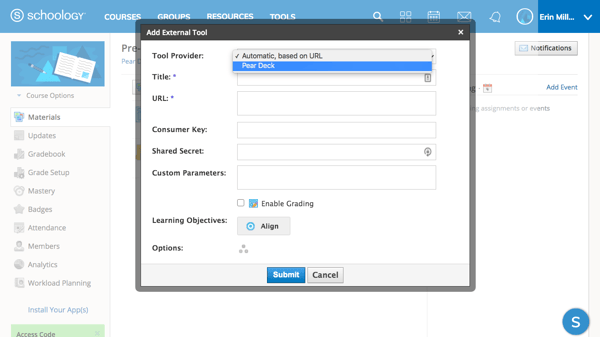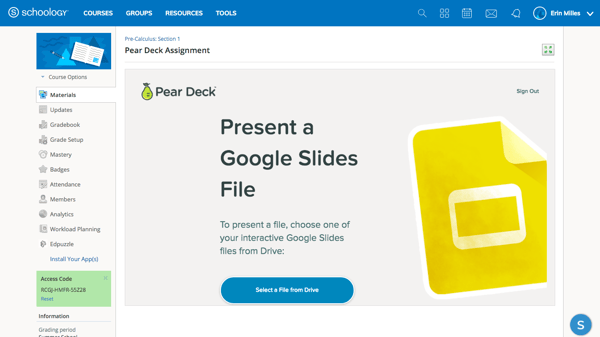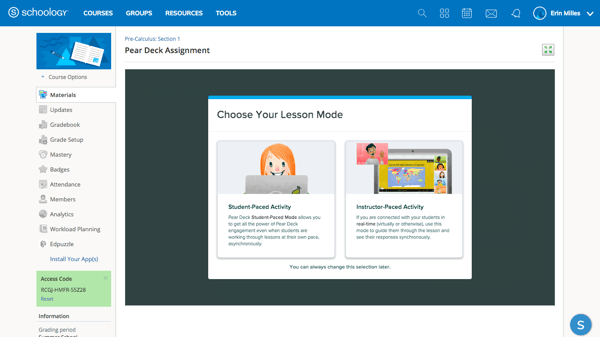joinpd.con Enter the code : Join a Presentation in Progress – Pear Deck
joinpd.con Enter the code : Join a Presentation in Progress – Pear Deck
When you integrate Pear Deck into Schoology, you turn a Pear Deck Session into an Assignment @ joinpd.con. This gives your students in Schoology instant access to the Session without needing a Join Code or Link @ joinpd.con, like they do in a traditional Pear Deck presentation Session.
Not only do you automatically save the responses you collect in your Sessions menu like always, but Schoology allows you to access your responses via the Teacher Dashboard all from within Schoology.
This function is currently restricted to users who are part of a school-wide or district-wide Pear Deck subscription. If you are unsure of your Pear Deck’s eligibility, please contact the Pear Deck administrators at your school or send us an email at help@peardeck.com.
Create a Pear Deck assignment @ joinpd.con
1. Open Schoology
2. Go to Courses. You can create a new course or open an existing one
3. On the Course page, click Add Materials and select Add File/Link/External Tool

3. In the pop-up window, select External Tool.

4. In the Tool Provider section, click on the drop-down menu and select Pear Deck

5. Customize your assignment with a Title, Parameters, Grading enablement, etc. The URL, Consumer Key, and Shared Secret have already been installed for you.
6. Make sure to check the Enable Grading box if you want students to be able to click Submit Work in Schoology when they’re done with this lesson.
7. Click Submit to return to the Courses page. Your assignment is now published. If you aren’t ready to continue configuring the session, you can un-publish the assignment until you have configured the session.
Start your assignment
1. Have an interactive Pear Deck for Google Slides or PowerPoint Online Slides file ready to present. The presentation files are saved automatically in your Google Drive or OneDrive and you will select the one you want to present to students in Step 5
2. Open the Schoology Courses page.
3. Click on the Pear Deck assignment you created. Note that you can give it any title when you create the assignment, but in this case I called it Pear Deck Assignment

4. Note that the assignment is now published. You may want to use the Gear icon to un-publish the assignment while you configure the session so it does not display for your students until you are ready.
5. Click on the Select a file from Drive or OneDrive button. The first time you present a Pear Deck file in Schoology, you will be required to log into Pear Deck.

6. In the file chooser, search for and select the Google Slides or PowerPoint Online Slides file from Drive or OneDrive that you want to present to your students.
7. Choose your Lesson Mode. Depending on the Lesson Mode you choose, one of the Presenter Views (Projector or Dashboard) opens for you in Schoology.

8. Student-Paced Mode (asynchronous; recommended for this integration): When you choose this Mode, the private Dashboard View opens so you can see students’ names next to their responses in real time. When students open this assignment, they get simple navigation controls on their Student View, allowing them to scroll through the slides in your presentation Session and respond to the interactive questions.
9. Instructor-Paced Mode (synchronous): When you choose this Mode, the Projector View opens and responses are anonymous by default on this View. The Student View of the slides syncs up to your slide on the Projector View, so you will need to click through the slides so students can see them and respond to interactive questions.
10. You have now created a new Pear Deck Session for your class within Schoology.
Have students complete your assignment
In order for students to “turn in” their Pear Deck assignment, the Pear Deck session must be in student-paced mode. The Student View is now available on your students’ Schoology page, so students simply:
- Log into Schoology
- Select your course
- Click on the Pear Deck Assignment to open the Student View of the Session. They can scroll through the slides and respond to interactive questions
- When they reach the end, they click Submit Work to turn in the assignment
Grade your assignment
In Schoology, you can grade assignments by completion and see the status of assignments for individual students. You can also open the Dashboard to view responses, and manually assign points in the Gradebook. You can also evaluate individual responses in Pear Deck.
In Schoology
- Open Schoology and go to Gradebook.
- In Course Options, select Grades. Use the Schoology tools to customize your grading options.
- Go back to the Courses page, and click on the Assignment to open the Teacher Dashboard. Click on the slides in the Dashboard to see the individual responses with their names (if the Projector View is open, click on the 3-dots menu to open the Dashboard in a new tab).
- You can toggle back to the Gradebook to adjust point values.
- In the Dashboard, you can leave feedback for individual students with Pear Deck Teacher Feedback.
FAQs
How many students can join Pear Deck?
There are other interactive tools to present to students. But, I find Pear Deck one of the easiest and most intuitive tools out there. Something to keep in mind is that you are only able to have 30 concurrent users at the same time. There are also limits in how many uploads you can have in the free version.
Is Pear Deck easy to use?
Pear Deck is incredibly user-friendly and offers many free tools. It is easy to embed questions into a slide, and joining the class group is very easy for students. They create a summary of performance at the end of a session as well, which helps review students’ progress.
How do students join a Pear Deck?
- The teacher starts a Pear Deck Session and gets the Join Link or Join Code to share with students.
- The student either: Clicks on the link OR. Goes to joinpd.com and types in the Join Code. …
- Now the student is in the Student View, where they can see the presentation slides and respond to interactive questions.
What is Pear Deck?
- Multiple choice – functions like an instant poll of your class.
- Numerical response – showing the results on a number line.
- Open-ended – allow students to answer questions in their own words.
- Draggable & drawable – students can label and draw right on their devices.
Can two teachers share a Pear Deck?
With the Shared Teacher Dashboard, you can invite co-teachers and certified staff members to your Pear Deck Sessions, giving them full access to your presentation and your students’ responses, in real time or after class. It’s the perfect way to use Pear Deck in a co-teaching or collaborative team teaching environment.
Why do teachers use Pear Deck?
Pear Deck is a program that enables instructors to enhance their Google Slides or PowerPoint presentations by creating questions embedded in the presentation that students can respond to and receive feedback on.
What is the weakness of Pear Deck?
The biggest weakness of Pear Deck is that student work often comes out messy. This is not the students’ fault, it is hard to write on the screen, especially if you don’t have a touchscreen. This is an issue because slides are too small to show adequate work.
What are the three view modes for Pear Deck?
Each Pear Deck Session has three Views: the Projector View, the Student View (which students enter when they join your Session), and the private Teacher Dashboard View.
Does Pear Deck use AI?
As artificial intelligence (AI) continues to make its mark on the educational landscape, Pear Deck aims to be at the forefront of creating trustworthy AI powered solutions for schools through our responsible AI principles.